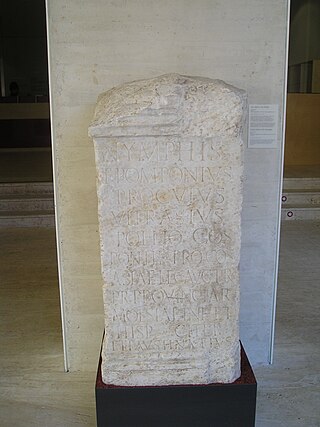Related Research Articles
Gnaeus Julius Verus was Roman senator and general of the mid-2nd century AD. He was suffect consul, and governed several important imperial provinces: Germania Inferior, Britain, and Syria.
Marcus Annius Verus was the paternal grandfather and adoptive father of the Roman Emperor Marcus Aurelius, and father-in-law of emperor Antoninus Pius.
Marcus Annius Libo was a Roman Senator active in the early second century AD.
Marcus Caeionius Silvanus was a Roman senator of the second century AD.

Marcus Nonius Macrinus was a Roman senator and general during the reigns of the Emperors Antoninus Pius, Lucius Verus, and Marcus Aurelius. Macrinus was suffect consul in the nundinium of April-June 154 as the colleague of [Prifernius ?] Paetus.
Lucius Plautius Lamia Silvanus was a Roman senator.
Annia Fundania Faustina was a noble Roman woman who lived in the Roman Empire during the 2nd century AD. She was the paternal cousin of Roman Emperor Marcus Aurelius and his sister Annia Cornificia Faustina.

Titus Pomponius Proculus Vitrasius Pollio was a Roman senator, who held several imperial appointments during the reign of Marcus Aurelius. He was suffect consul in an undetermined nundinium around 151; he was a consul ordinarius in the year 176 with Marcus Flavius Aper as his colleague.
Appius Annius Trebonius Gallus, sometimes known as Appius Annius Gallus was a Roman senator and consul.
Marcus Annius Flavius Libo was a Roman Senator who lived in the second half of the 2nd century and first half of the 3rd century. He was consul ordinarius in AD 204 with Lucius Fabius Cilo as his senior colleague.
Lucius Hedius Rufus Lollianus Avitus was a Roman senator and military officer. He was consul in the year 144 as the colleague of Titus Statilius Maximus.
Publius Martius Verus was a Roman senator and general. He was twice consul. Verus played a major role in the suppression of the revolt of Avidius Cassius by remaining loyal to the emperor Marcus Aurelius.
Marcus Vettulenus Civica Barbarus was a Roman senator of the second century AD. A member of the Patrician class, he held the office of consul ordinarius in 157 with another patrician, Marcus Metilius Aquillius Regulus, as his colleague. Barbarus was also a member of the sodales Antoniniani, a religious fraternity which attended to the cult of the emperor Antoninus Pius.
Lucius Dasumius Tullius Tuscus was a Roman senator who was an amici or trusted advisor of the emperors Antoninus Pius and Marcus Aurelius. He was suffect consul in the nundinium of April to June 152 AD as the colleague of Publius Sufenas.
Marcus Pontius Laelianus Larcius Sabinus was a Roman senator and general who held a series of offices in the emperor's service. He was suffect consul for the nundinium of July-August 145 as the colleague of Quintus Mustius Priscus. Laelianus is primarily known through inscriptions.
Quintus Camurius Numisius Junior was a Roman senator active during the later second century AD. He was suffect consul for a nundinium in the first half of the year 161 as the colleague of Marcus Annius Libo.
The gens Rupilia, occasionally written Rupillia, was a minor plebeian family at ancient Rome. Members of this gens are first mentioned in the latter part of the Republic, and Publius Rupilius obtained the consulship in 132 BC. Few others achieved any prominence, but the name occurs once or twice in the consular fasti under the Empire. The name is frequently confounded with the similar Rutilius.
Titus Flavius Boethus was a Roman senator, who was active during the reign of Marcus Aurelius. He is known as being an acquaintance of the physician Galen. Boethus was suffect consul in one of the nundinia falling in the later half of 161 with [? Julius] Geminus Capellianus as his colleague.
Marcus Servilius Fabianus Maximus was a Roman senator, who was active during the reigns of Antoninus Pius and Marcus Aurelius. He was suffect consul in a nundinium in mid-158 with Quintus Jallius Bassus as his colleague.
Marcus Cominius Secundus was a Roman senator, who was active during the reign of Marcus Aurelius. He was suffect consul in one of the later nundinia of 151 with Lucius Attidius Cornelianus as his colleague. He is known from inscriptions and military diplomas issued during his time.
References
- ↑ Werner Eck, "Die Fasti consulares der Regierungszeit des Antoninus Pius, eine Bestandsaufnahme seit Géza Alföldys Konsulat und Senatorenstand" in Studia epigraphica in memoriam Géza Alföldy, hg. W. Eck, B. Feher, and P. Kovács (Bonn, 2013), p. 80
- ↑ Birley, Marcus Aurelius: A Biography, revised edition (London: Routledge, 1993), p. 125
- ↑ Géza Alföldy dates Libo's death to 163 (Konsulat und Senatorenstand unter der Antoninen (Bonn: Rudolf Habelt Verlag, 1977), p. 240)
- ↑ Historia Augusta , "Lucius Verus", 9.2
- ↑ Birley, Marcus Aurelius, p. 131
- ↑ Settipani, Christian (2000). Continuité gentilice et continuité familiale dans les familles sénatoriales romaines à l'époque impériale mythe et réalité (in Italian). Unit for Prosopographical Research, Linacre College, University of Oxford. p. 185.